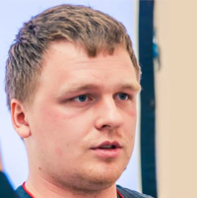- Conference
- Program
- Speakers
- Location
|
|
Nick Sutterer To Be Announced Nick Sutterer is proud to be a member of the Ruby open source community. His Cells and Apotomo projects have been bringing increased view modularity and event-driven programming to Rails for years. He has enjoyed attending, and speaking at, Ruby conferences around the world. Buy him a beer sometime, and with very little prompting, he will tell you why there should be no such thing as a double-render error, why you should not confuse your models with your resources, and how to play a mean bass in a punk rock band. |
|
|
Kevin Triplett Two Cartoon Foxes: The _why Documentary A programmer and artist, Kevin has been making films since he became a wee lad, back in the early 1970s. He hails from Texas and is currently a nomad, whereabouts unknown.
|
|
|
Akira Matsuda To Be Announced CRuby core member, Probably the most active Rails core contributor in Japan, the founder of a Japanese Ruby community Asakusa.rb.
|
|
|
Konstantin Haase To Be Announced OSS developer. Conference-goer. Maintainer of Sinatra, full time developer on Travis CI, was full time on Rubinius, core team member of Rack, Tilt and many more.
|
|
|
Martin Boßlet Krypt. Semper Pi. Martin is a freelancer by day, by night he is also a member of ruby-core, one of the maintainers of the Ruby OpenSSL extension and the author of krypt. Cryptography is his passion, and not only after the epiphany he had once realizing that his last name carries "ssl" in it.
|
|
|
Dimitri Krassovski Ruby, Multidispatch and ponies We’ve all grown into loving a praising Ruby. It is indeed a great language, but are there things out there we’re missing out? Multidispatch? List Comprehensions? Pattern Matching? A short journey into other languages, their paradigms, and how we live without them. Also, ponies! |
|
|
Alexey Vasiliev Let's GO Software engineer at Railsware in Kiev, Ukraine. Developed such products as: PopCornUA (android and iphone applications), MongodbLogger (logger for Rails), SmtRails (shared mustache templates for Rails), PIRO (the rocket for pivotal tracker account), Webp-ffi and many others. Creator of Open Source training manual for setting up and scaling of PostgreSQL in Russian. Leading Russian podcast about Ruby and JS - RWpod. |
|
|
Michael Klishin Rabbit guts: how RabbitMQ works under the hood, and why RabbitMQ is a popular multi-protocol messaging middleware. This talk explores how it works internally and why. Clustering, I/O and durability, flow control, asynchronous replication, plugin architecture, support for multiple protocols: how can all of this fit into just a few thousands lines of code? Can these lessons be applied to other servers and middleware? Multilingual and curious about how things work, Michael spends most of hist time working with and learning about data, concurrency, parallelism, and functional programming. He also tries to make the Clojure ecosystem a better place with ClojureWerkz and tweets an ungodly number of animated gifs. He is currently at Pivotal working on RabbitMQ. |
|
|
Karel Minařík Elasticsearch: Search & Analytics Karel Minařík is as a freelance designer and developer of web applications, consultant, software architect and Ruby/Rails and NoSQL evangelist. He lives in Prague with his wife and two daughters. Find out more at http://karmi.cz.
|
|
|
Moisey Uretsky Lean Development Moisey is Head of Product of DigitalOcean, a rapidly growing cloud hosting provider built on Rails that offers fast SSD virtual servers. DigitalOcean currently hosts leading sites within the Rails community which include guides.rubyonrails.org and railscasts.com. Moisey is in charge of a talented team of Rails developers and is focused on building the next revolutionary cloud. |
|
|
Marek Jelen PaaS In my talk I would like to talk about PaaSes in general. I am sure most people use them and are familiar with the front-end functionality. I want to focus on the backends and how such platforms work internally. We shall deep dive into OpenShift and CloudFoundry and will discuss the underlying technologies - LXC, SELinux,cGroups, AuFS, Warden. Yes, we will also poke into Docker and we also may touch Vagrant. |
|
|
Ben Lovell Zomgscale! With Celluloid & JRuby ZOMG - your CPUs have chilly chills! Light a fire under your cores and keep warm at night by unleashing the awesomeness contained within Celluloid & JRuby! We'll talk about the state of concurrency and parallelism in ruby (no GIL whining, I promise) and how the landscape is changing thanks to Moore's Law no longer standing stead. I'll muse upon the problems with processes and threads for concurrency and parallelism and how the actor model largely solves those issues. You won't even have to sport a huge unix beard to play along. Unless you want to. In which case - BEARD ON! Finally I will show via the medium of code how Celluloid & JRuby are a mature and simple to reason about combination of sheer awesomes! I'll give a brief overview of Celluloid and some pointers on how best to apply it. This stuff isn't witchcraft, do not be afraid! |
|
|
Konstantin Tennhard Natural Language Processing with Ruby Natural Language Processing (NLP) is the art and science of making sense of user-generated data. It is a combination of state-of-the-art computer science techniques and linguistics. Being able to analyze plain text data allows us to gain a lot of insights. Popular NLP tasks are text summarization, keyword extraction or automatic extraction of the author’s opinion from a text. In the age of social media, only NLP provides solutions to analyze what users are really care about. Companies such as Google or Facebook invest millions in NLP solutions to harvest information from all the data they have been gathering over the years. In this talk, I will present you a real-world NLP problem. We will discuss this problem from both, the linguistic and the computer science perspective. Throughout the talk, we will develop a processing pipeline to efficiently solve this problem in an automated fashion. An NLP pipeline usually consists of multiple components, each solving one aspect of the problem and presenting its own challenges. Among other things, you will learn how to tackle the following essential NLP problems using JRuby and OpenNLP: • Sentence segmentation, • Tokenization, • Part-of-speech tagging, and • Named entity recognition. Konstantin is a computer scientist who specializes in developing large scale internet applications. He is passionate about software design, test driven development and all sorts of modern web-technology. His main scientific interest is natural language |












